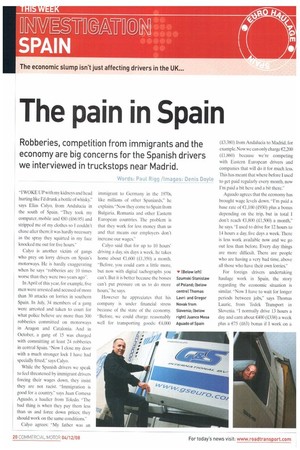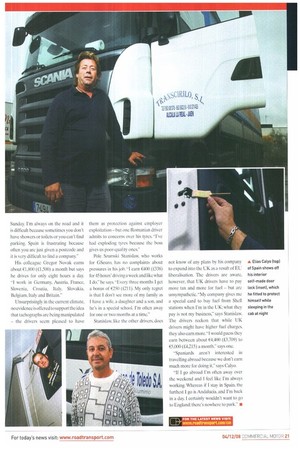The pain in Spain
Page 20

Page 21

If you've noticed an error in this article please click here to report it so we can fix it.
Robberies, competition from immigrants and the economy are big concerns for the Spanish drivers we interviewed in truckstops near Madrid.
Words: Paul Rigg /Images: Denis Doyle "I WOKE UP with my kidneys and head hurting like I'd drunk a bottle of whisky." says Elias Calyo, from Andalucia in the south of Spain. "They took my computer, mobile and €80 (£66.95) and stripped me of my clothes so I couldn't chase after them; it was hardly necessary as the spray they squirted in my face knocked me out for five hours."
Calyo is another victim of gangs who prey on lorry drivers on Spain's motorways. He is hardly exaggerating when he says -robberies are 10 times worse than they were two years ago".
In April of this year, for example, five men were arrested and accused of more than 30 attacks on lorries in southern Spain. In July, 34 members of a gang were arrested and taken to court for what police believe are more than 300 robberies committed on motorways in Aragon and Catalonia. And in October, a gang of 15 was charged with committing at least 24 robberies in central Spain. -Now I close my door with a much stronger lock I have had specially fitted," says Calyo.
While the Spanish drivers we speak to feel threatened by immigrant drivers forcing their wages down, they insist they are not racist. "Immigration is good for a country," says Juan Comesa Aguado, a haulier from Toledo. "The had thing is when they pay them less than us and force down prices; they should work on the same conditions."
Calyo agrees: "My father was an immigrant to Germany in the 1970s, like millions of other Spaniards," he explains. "Now they come to Spain from Bulgaria, Romania and other Eastern European countries, The problem is that they work for less money than us and that means our employers don't increase our wages."
Calyo said that for up to 10 hours' driving a day, six days a week, he takes home about €1,600 (£1,350) a month. "Before, you could earn a little more. but now with digital tachographs you can't. But it is better because the bosses can't put pressure on us to do more hours," he says.
However he appreciates that his company is under financial stress because of the state of the economy. "Before, we could charge reasonably well for transporting goods: €4,000
(L380) from Andalucia to Madrid, for example. Now we can only charge €2,200 (£1,860) because we're competing with Eastern European drivers and companies that will do it for much less. This has meant that where before I used to get paid regularly every month, now I'm paid a bit here and a bit there."
Aguado agrees that the economy has brought wage levels down. "I'm paid a base rate of €1,100 (£930) plus a bonus depending on the trip, but in total I don't reach €1,800 (£1,500) a month," he says. "I used to drive for 12 hours to 14 hours a day, five days a week. There is less work available now and we go out less than before. Every day things are more difficult. There are people who are having a very had time, above all those who have their own lorries."
For foreign drivers undertaking haulage work in Spain, the story regarding the economic situation is similar. "Now I have to wait for longer periods between jobs," says Thomas Laurie, from Tedek Transport in Slovenia. "I normally drive 13 hours a day and earn about €400 (£338) a week plus a €75 (£63) bonus if I work on a Sunday. I'm always on the road and it is difficult because sometimes you don't have showers or toilets or you can't find parking. Spain is frustrating because often you are just given a postcode and it is very difficult to find a company."
His colleague Gregor Novak earns about €1,800 (€1,500) a month but says he drives for only eight hours a day. "1 work in Germany, Austria. France, Slovenia, Croatia. Italy, Slovakia, Belgium, Italy and Britain."
Unsurprisingly in the current climate, no evidence is offered to support the idea that tachographs are being manipulated — the drivers seem pleased to have
them as protection against employer exploitation — but one Romanian driver admits to concerns over his tyres. "I've had exploding tyres because the boss gives us poor-quality ones."
Pole Szumski Stanislaw, who works for GSeuro, has no complaints about pressures in his job. "I earn €400 (€338) for 45 hours' driving a week and like what I do," he says."Every three months I get a bonus of €250 (f_21)). My only regret is that I don't see more of my family as I have a wife, a daughter and a son, and he's in a special school. I'm often away for one or two months at a time."
Stanislaw, like the other drivers, does not know of any plans by his company to expand into the UK as a result of EU liberalisation. The drivers are aware, however, that UK drivers have to pay more tax and more for fuel — but are unsympathetic. "My company gives me a special card to buy fuel from Shell stations when I'm in the UK; what they pay is not my business," says Stanislaw. The drivers reckon that while UK drivers might have higher fuel charges, they also earn more."I would guess they earn between about €4,400 (L3,709) to €5,000 (£4,215) a month," says one.
"Spaniards aren't interested in travelling abroad because we don't earn much more for doing it," says Calyo.
"If I go abroad I'm often away over the weekend and I feel like I'm always working. Whereas if I stay in Spain, the furthest I go is Andalucia, and I'm back in a day. I certainly wouldn't want to go to England; there's nowhere to park." •




















































































































































